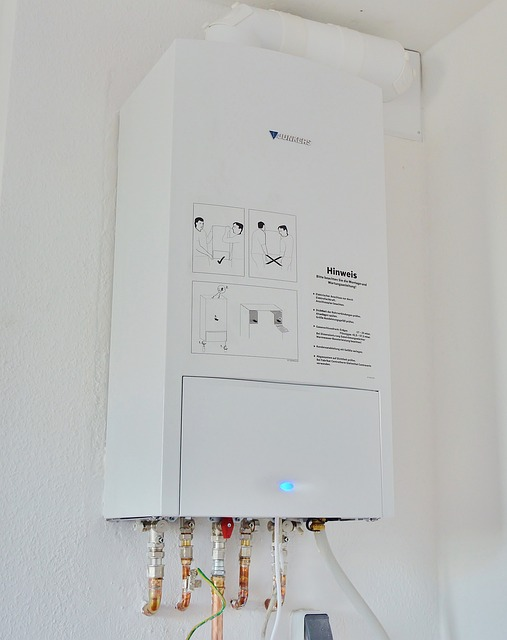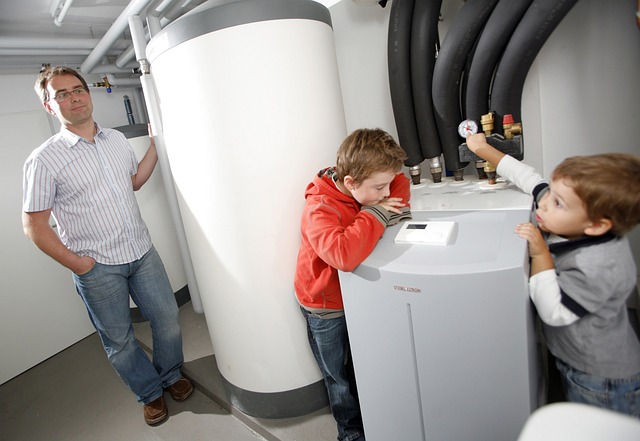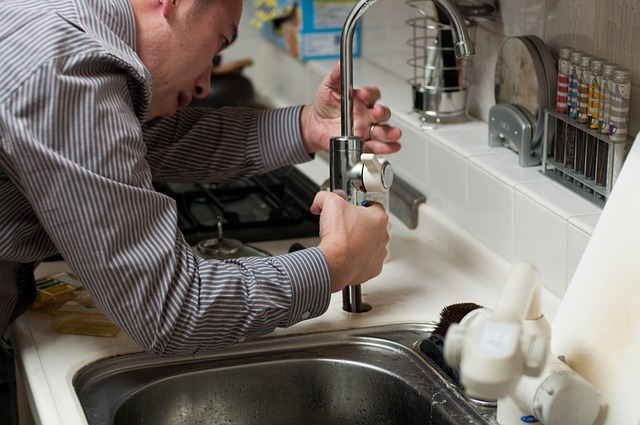If you’re unfamiliar with HVAC systems, you may be wondering whether your hvac include water heater? Typically, the response is no. While water heating is normally handled by a separate unit as part of your plumbing system, HVAC systems are typically used for heating and cooling.
However, some hybrid systems, like heat pump water heaters with boilers are also in use. They may produce both heat and hot water, integrate components of heating and air conditioning and water heating.
We’ll look at how these systems interact in this blog post to keep your home at a comfortable temperature and provide hot water.

Does HVAC Include a Water Heater?
No, HVAC does not include a water heater. HVAC systems are designed to control the temperature and air quality of a building, while water heaters are designed to heat water.
These are two separate systems that serve different purposes. However, some HVAC systems can be integrated with a water heater to provide both heating and hot water. These systems are called hybrid HVAC systems.
Is a water heater an appliance or HVAC?
A water heater is considered an appliance, not part of HVAC (Heating, Ventilation, and Air Conditioning) systems. It is a standalone device designed to heat and store water for domestic use, such as bathing, washing dishes, and laundry. In contrast, HVAC systems encompass a broader range of equipment responsible for heating, cooling, and regulating indoor air quality in buildings.
The distinction lies in their specific functions: water heaters focus on heating water for daily use, while HVAC systems address temperature control and air circulation throughout a building.
Also Read: Why your water heater vent pipe is leaking
Is the hot water heater part of the furnace?
No, the hot water heater is not part of the furnace. The furnace is a heating system that generates and distributes warm air throughout the building to provide heating.
On the other hand, the hot water heater, also known as a water heater, is a separate appliance responsible for heating water for domestic use. It supplies hot water to taps, showers, and appliances like washing machines and dishwashers.
While both the furnace and hot water heater contribute to the overall comfort of a home, they serve distinct purposes and are independent systems.
What does the heating system in HVAC consist of?
The heating system in HVAC (Heating, Ventilation, and Air Conditioning) typically consists of a furnace or heat pump, ductwork, and a thermostat. The furnace or heat pump is responsible for generating heat and distributing it throughout the building. Ductwork serves as the pathway for warm air to reach various rooms.
The thermostat controls the temperature by signaling the heating system to turn on or off based on the desired settings. Together, these components work harmoniously to provide a comfortable indoor environment during colder months, ensuring efficient heating and warmth throughout the living or working space.
The difference between HVAC and water heating systems
The difference between HVAC and water heating systems, refers to the fact that these two types of systems are typically separate and serve different purposes in a home.
HVAC System
HVAC, or heating, ventilation, and air conditioning, is a system used to control the temperature and air quality in a home or building. This typically involves a network of ducts, fans, and heating and cooling units that circulate air throughout the space.
Water Heating System
On the other hand, a water heating system is used to heat water for domestic use, such as showering, washing dishes, and laundry. This is typically accomplished with a water heater, which can be powered by gas, electricity, or other sources of energy.
While HVAC and water heating systems may serve similar purposes in providing comfort and convenience in a home, they are distinct systems that are typically installed and maintained separately.
HVAC systems are typically installed and serviced by HVAC technicians, while water heating systems are typically the domain of plumbers.
However, there are some hybrid systems that combine elements of both HVAC and water heating, such as heat pump water heaters with boilers, which can provide both heat and hot water. In these cases, both the HVAC system and connected plumbing professionals may be involved in installation and maintenance.
Hybrid HVAC-water heating systems: How do they work?
Hybrid HVAC-water heating systems refers to systems that combine elements of both heating, ventilation, and air conditioning (HVAC) and water heating. These systems are designed to provide both heat and warm water for a home, allowing homeowners to save space and potentially save on energy costs by using a single system for both purposes.
There are several different types of hybrid HVAC-water heating systems available on the market, but they all work by using a heat pump to extract heat from the air or ground and transfer it to the water in a storage tank.
This heat pump can also be used to provide heating for the home, making it a versatile and efficient option for homeowners who want to combine their HVAC and water heating systems. Some systems also include a backup heating source, such as a boiler, to provide additional heat during times of high demand or when the heat pump is not sufficient.
Are heat pump water heaters with boilers worth the investment?
A heat pump water heater with a boiler is a type of hybrid system that combines elements of both HVAC and water heating. These systems use a heat pump to extract heat from the air or ground and transfer it to the water, making them more energy efficient than traditional water heaters that use electric resistance or natural gas to heat the water.

In addition to the heat pump, a heat pump water heater with a boiler also includes a small backup boiler that can be used to provide additional heat when needed, such as on particularly cold days. This can help to ensure that your hot water is always available, even when the heat pump is not able to provide enough heat on its own.
Investing in a heat pump water heater with a boiler can be a good decision, but several factors should be considered before making a final decision. Some of the crucial factors to consider include:
Energy Efficiency
Heat pump water heaters with boilers are known for their high energy efficiency, making them a popular choice among homeowners.
Cost
The cost of a heat pump water heater with a boiler can vary depending on the brand, size, and installation requirements. While they may cost more initially, heat pump water heaters with boilers tend to pay for themselves over time due to their energy efficiency.
Availability of Renewable Energy
Heat pump water heaters with boilers operate by using electricity to power the heat pump and a small amount of natural gas to heat water. Therefore, if renewable energy sources like solar panels are available, it can help to reduce the overall carbon footprint of the system.
Location and Climate
Heat pump water heaters with boilers work best in areas with a moderate climate since they extract heat from the surrounding air to heat water. If the location is colder or has extreme weather conditions, the system may not work as efficiently.
Water Usage
The amount of water used in a household can affect the efficiency of the heat pump water heater with the boiler. Homes with high water usage may require a larger system to meet their needs, which can increase the installation cost. Therefore, it is essential to consider water usage when deciding if this system is a worthwhile investment.
If you’re considering a heat pump water heater with a boiler for your home, it’s a good idea to consult with a professional HVAC technician who can help you determine if it’s the right choice for your needs.
Pros and cons of combining HVAC and water heating systems
Combining HVAC and water heating systems, also known as hybrid system, can have both advantages and disadvantages. On the plus side, a hybrid system can be more energy efficient than separate central air conditioner and water heating systems.
Here’s a table of the pros and cons of combining HVAC and water heating systems:
| Pros | Cons |
|---|---|
| Saves space: Combining HVAC and water heating systems can save space in your home. | Higher upfront cost: Combining HVAC and water heating systems can be more expensive upfront than purchasing separate systems. |
| Energy efficiency: Combined systems can be more energy efficient, reducing energy bills and carbon footprint. | Requires professional installation: Proper installation of a combined system requires the expertise of a licensed HVAC technician. |
| Improved indoor air quality: A combined system can improve indoor air quality by providing better filtration and humidity control. | Maintenance costs: Maintenance costs can be higher for a combined system due to the complexity of the system. |
| Improved convenience: A combined system can provide improved convenience by having a single system to control both heating, cooling, and water heating. | Compatibility issues: Some HVAC and water heating systems may not be compatible, making it difficult to combine them. |
| Longer lifespan: A combined system may have a longer lifespan since it shares some components. | Higher repair costs: If a component fails, it may affect both the HVAC and water heating systems, resulting in higher repair costs. |
| Potential for tax credits: Some combined systems may be eligible for tax credits or rebates, reducing the overall cost. | Requires additional space: A combined system may require additional space for installation and maintenance, especially if it needs ductwork or a larger tank. |
The role of a plumber in HVAC-water heating system installation and maintenance
The role of a plumber in HVAC-water heating system installation and maintenance is crucial. As a professional trained in plumbing and HVAC systems, a plumber is responsible for installing and maintaining the water heating system, ensuring that it functions efficiently and effectively.
During the installation process, a plumber will first assess the space and determine the best location for the water heating system. They will then carefully install the system, ensuring that all components are properly connected and functioning correctly. This includes the water heater, pipes, and other necessary components.

Once the system is installed, a plumber will also be responsible for regular maintenance and repair. This includes checking for leaks, ensuring the system is operating at optimal efficiency, and replacing any worn or damaged components. In the event of a problem, a plumber will troubleshoot and fix the issue, ensuring that the water heating system continues to operate smoothly and efficiently.
How Much Does it Cost to Install an HVAC System with a Water Heater?
The cost of installing an HVAC system with a water heater depends on various factors such as the size of the building, the type of HVAC system, and the type of water heater. On average, the cost of installing an HVAC system with a water heater can range from $7,500 to $15,000.
According to Forbes the average cost of installing a new HVAC system is estimated to be $7,000 and for water heater the cost is around $1,000. However, the cost can vary depending on the location, the contractor, and other factors.
